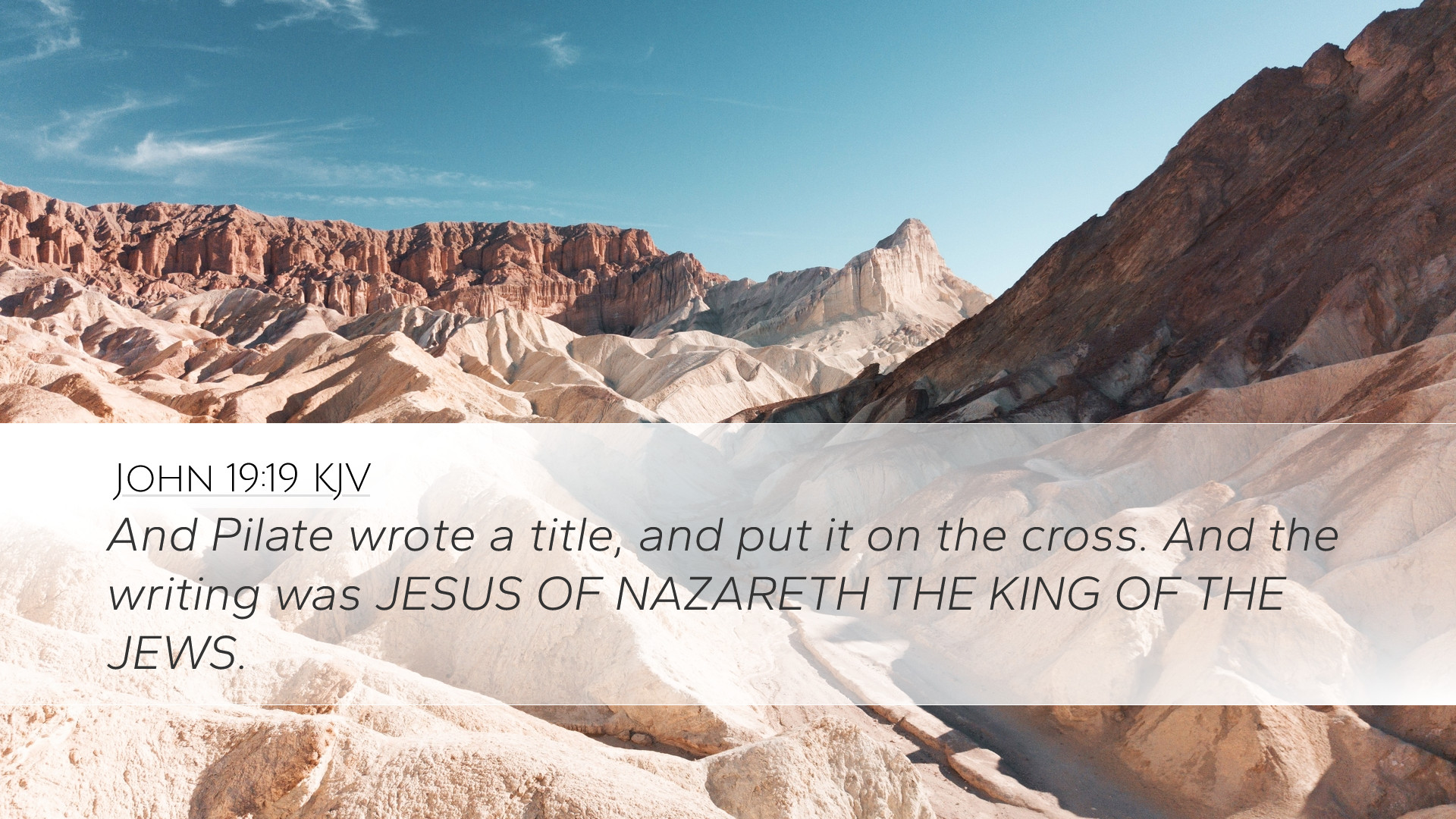Commentary on John 19:19
John 19:19 reads: "And Pilate wrote a title, and put it on the cross. And the writing was, JESUS OF NAZARETH The King OF THE JEWS." This verse stands at a crucial juncture in the Gospel narrative, encapsulating significant theological and historical implications. Below is an insightful commentary derived from public domain sources by Matthew Henry, Albert Barnes, and Adam Clarke.
1. Context of the Verse
This verse occurs in the context of Jesus' crucifixion and is part of Pilate's actions following the trial of Jesus. After the condemnation, Pilate, in a somewhat ironic twist, declares Jesus' identity for all to see. The placement of the title on the cross serves both to fulfill prophecy and to communicate an important message about Jesus' kingship.
2. Pilate's Contradictory Role
According to Matthew Henry, Pilate appears as both a reluctant judge and an unwitting prophet. He recognized Jesus' innocence yet succumbed to the pressure of the Jewish leaders:
- Political Pressure: Pilate's political survival depended on appeasing the crowd, which compounded his moral failings.
- Public Testimony: By inscribing "The King of the Jews," Pilate unwittingly affirmed Jesus' royal status, highlighting the irony of the situation.
3. The Title's Significance
Albert Barnes notes that the title written by Pilate carries profound implications. It serves as both a statement of fact and an accusation:
- Affirmation of Christ’s Identity: The title confirms Jesus' role as the Messiah, despite the tragic irony of His crucifixion.
- Public Mockery: It acted as a mockery of Jesus, intended to ridicule the notion of a crucified King, yet it also proclaims His true identity.
4. Theological Implications
Adam Clarke highlights several theological dimensions of this verse:
- Fulfillment of Prophecy: The inscription fulfills scriptural prophecies regarding the Messiah, echoing Zechariah 9:9, where He is proclaimed as a king.
- Universal Kingship: The universality of this title points to Christ's kingship that extends beyond Israel – a significant concept for John’s audience.
5. Reactions to the Inscription
The Jewish leaders were offended by Pilate’s declaration. Barnes notes their insistence that Pilate should change the wording, stating that it should read, "He said, I am King of the Jews." This request underscores their unwillingness to acknowledge Jesus' true identity.
6. Reflection on Jesus' Kingship
Matthew Henry emphasizes the irony of the inscription. In the midst of apparent humiliation and defeat, it declares Jesus's reign:
- Christ's Sovereignty: His kingship is not diminished by crucifixion; rather, through His suffering, He establishes a kingdom that transcends earthly powers.
- Spiritual Authority: Jesus' reign is primarily spiritual; He rules in the hearts of believers, bringing a different kind of power and authority.
7. Application for Today’s Believers
For pastors, students, and scholars, John 19:19 presents opportunities for reflection and application:
- Understanding Kingship: Believers are called to recognize Jesus as King in their lives, emulating His leadership style characterized by humility and sacrifice.
- Faith Amidst Opposition: Just as Jesus faced public ridicule, Christians today may encounter similar situations where their faith is challenged. The inscription serves as encouragement to stand firm in their identity in Christ.
- Sharing the True Identity of Christ: The personal reflection on how to proclaim Jesus' identity as King in a world that often denies it is critical for effective witness.
8. Conclusion
In summary, John 19:19 encapsulates the paradoxical nature of Jesus' kingship as portrayed through Pilate's inscription. It stands as a reminder of the intersection between worldly power and divine sovereignty. This commentary invites reflection on the implications of this verse not only in its immediate context but also for contemporary faith practice.


